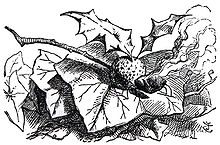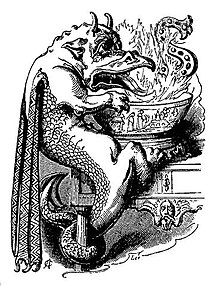Snapdragon (game)
Snapdragon (aka Flapdragon , snapdragon , or Flapdragon , in German texts and dragon Grab or fire dragon ) was in England popular board game from the 16th to the 20th century. It was mostly played in winter, for example on Christmas Eve .
procedure
Brandy is poured into a shallow bowl. Raisins (or other dried fruits ) are added and the brandy ignited. Michael Faraday advises “that in order to get a really nice Snapdragon one must take a well-warmed bowl; you should also warm the plums and brandy beforehand. ”The lights in the room are dimmed. In turn, the players try to fish as many raisins as possible from the burning liquid with their bare fingers and eat them, despite the risk of burns. Experienced players manage to extinguish the burning raisins by quickly closing their mouths. The winner is whoever has eaten the most raisins. In another version, one of the raisins is marked and the winner is whoever receives this "lucky raisin".
As described in Robert Chambers ' Book of Days (1879), the game is accompanied by a chant:
Here he comes with flaming bowl,
Don't he mean to take his toll,
Snip! Snap! Dragon!
Take care you don't take too much,
Be not greedy in your clutch,
Snip! Snap! Dragon!
With his blue and lapping tongue
Many of you will be stung,
Snip! Snap! Dragon!
For he snaps at all that comes
Snatching at his feast of plums,
Snip! Snap! Dragon!
But Old Christmas makes him come,
Though he looks so fee! fa! fum!
Snip! Snap! Dragon!
Don't 'ee fear him but be bold -
Out he goes his flames are cold,
Snip! Snap! Dragon!
Snapdragon in literature
Lewis Carroll

Lewis Carroll mentions the Snapdragon fly in the book Alice Behind the Looking Glass (1871) :
"'Look on the branch above your head,' said the Gnat, 'and there you'll find a snap-dragon-fly. Its body is made of plum-pudding, its wings of holly-leaves, and its head is a raisin burning in brandy. ' 'And what does it live on?' 'Frumenty and mince pie,' the Gnat replied; 'and it makes is nest in a Christmas box.' 'And then there's the Butterfly,' Alice went on, after she had taken a good look at the insect with its head on fire, and had thought to herself, 'I wonder if that's the reason insects are so fond of flying into candles - - because they want to turn into Snap-dragon-flies! '»
"Look at the branch above your head," said the mosquito, "you will find a Snapdragon fly there. Its body is made of plum pudding , its wings are made of holly leaves, and its head is a brandy-burning raisin." "And what does she live on?" " Frumenty and Mince Pie ," replied the mosquito, "and it makes its nest in a Christmas box." “And then there's the butterfly,” Alice went on, after taking a good look at the insect with her head in the fire, thinking to herself, “I wonder if that's why insects like them so much fly in candles - because they want to turn into Snapdragon flies! ""
In Tim Burton's film Alice in Wonderland, Alice encounters Snapdragon flies, but here they are flies in dragon form.
Agatha Christie
In Agatha Christie's book The Snow White Party (1969), at the beginning of the plot, a girl is murdered during a Snapdragon game (in translation, fire dragon ). In the film adaptation from the series Agatha Christie's Poirot , the game is shown in detail, the singing appears repeatedly to accompany the plot.
Michael Faraday
Michael Faraday mentions the game Snapdragon in his essay Natural History of a Candle (1861) and explains the scientific background.
Lingua
In the play Lingua, or the Combat of the Tongue and the Five Senses for Superiority (1607), the assumption is made that the play goes back to Hercules , in memory of his fight with the fire-breathing dragon in the garden of the Hesperides .
Charles Dickens
Charles Dickens has the main character Samuel Pickwick play the game (in translation, dragon snapper ) in his first novel The Pickwickier .
Juliana Horatia Ewing
In the story Snap-Dragons (1888) by Juliana Horatia Ewing , the Snap-Dragons come to life after the game and have an educational effect on the contentious Harry.
Elbridge Streeter Brooks
In the short story Master Sandy's Snapdragon (around 1890) by Elbridge Streeter Brooks , eleven-year-old Prince Charles receives the “lucky raisin” in 1611 and asks his father King James to release Walter Raleigh as a prize .
Web links
- Fitzgerald, Waverly: Playing Snapdragon. In: School of the Seasons. July 28, 2009, accessed July 29, 2010 .
Individual evidence
- ↑ a b Michael Faraday : Natural history of a candle . With an introduction and biography by Peter Buck. Didaktischer Dienst Franzbecker, Hildesheim 1980, ISBN 3-88120-010-X , p. 50 ff . (English, English online version German online version [accessed on August 3, 2010] Original title: The Chemical History of a Candle .).
- ^ Samuel Johnson : A dictionary of the English language . in which the words are deduced from their originals, explained in their different meanings and authorized by the names of the writers in whose works they are found. Richard Bentley, London 1785, p. 674 (English, online version [accessed July 29, 2010]).
- ^ A b Elbridge Streeter Brooks : Master Sandy's Snapdragon . In: Asa Don Dickinson, Ada M. Skinner (Eds.): The Children's Book of Christmas Stories . IndyPublish.com, Whitefish 2003, ISBN 1-4043-4637-6 (English, online version from Project Gutenberg [accessed July 30, 2010] reprint).
- ^ A b Robert Chambers : Chambers's Book of Days . JB Lippincott & Co., Philadelphia 1879 (English, online version with search function, online facsimile version [accessed July 29, 2010]).
- ↑ Lewis Carroll , John Tenniel (Illustrator): Alice behind the mirrors . Insel Taschenbücher, No. 97. Insel, Frankfurt 1993, ISBN 3-458-31797-X (English, English online version [accessed July 29, 2010] Original title: Through the Looking-Glass . Translated by Christian Enzensberger ).
- ↑ Agatha Christie : Snow White Party . 3. Edition. Fischer Taschenbuch Verlag, Frankfurt 2005, ISBN 3-596-16951-8 (English, original title: Hallowe'en Party . Translated by Hiltgunt Grabler).
- ^ Lingua, or the Combat of the Tongue and the Five Senses for Superiority . In: Robert Dodsley, Isaac Reed, Octavius Gilchrist, John Payne Collier (Eds.): A Select Collection of Old Plays . in twelve volumes. tape V . Septimus Prowett, London 1825, p. 180 f . (English, online version at google-books [accessed on July 30, 2010]).
- ^ Charles Dickens : The Pickwickians . 6th edition. Diogenes, Zurich 2002, ISBN 3-257-21405-7 , chap. 28 (English, full text online in Projekt Gutenberg ( English online version ) [accessed July 30, 2010] Original title: The Posthumous Papers of the Pickwick Club . Translated by Gustav Meyrink ).
- ↑ Juliana Horatia Ewing : Snap Dragons . A Tale of Christmas Eve. Ed .: Society for Promoting Christian Knowledge. London 1888 (English, online version [accessed July 31, 2010]).
